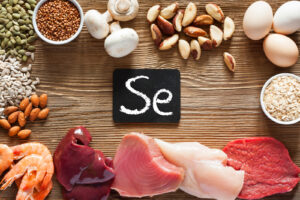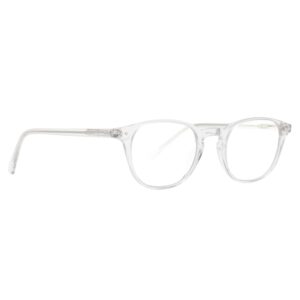
Key Takeaways
- Selenium is a crucial mineral that supports eye health and can prevent conditions like cataracts and macular degeneration.
- A deficiency in selenium can lead to vision problems and eye diseases.
- Selenium acts as an antioxidant, fighting the oxidative stress that can harm your eyes.
- People with thyroid conditions may experience improved eye health with proper selenium intake.
- It’s essential to get selenium from both diet and supplements, but it’s important to know the right amounts for safety and effectiveness.
Unlocking the Power of Selenium for Your Eyes

Imagine a world where your eyesight remains sharp and clear, where the threat of vision problems diminishes. This isn’t a distant reality, but one that can be achieved with the help of a tiny yet powerful ally: selenium. This essential mineral is a game-changer for eye health, and here’s how you can harness its benefits.
The Vital Role of Selenium in Eye Health
Why should you care about selenium? Because your eyesight, one of your most precious senses, could depend on it. Selenium is a trace mineral found in soil, water, and certain foods. It’s vital for the production of glutathione peroxidase, an enzyme that acts as a natural antioxidant protecting the body’s cells, including those in your eyes.
Selenium’s antioxidant properties help to neutralize free radicals—unstable molecules that can damage cells and lead to chronic diseases, including those that affect the eyes. By maintaining a healthy balance of selenium, you’re not just supporting your vision, but you’re also contributing to your overall well-being.
Understanding Selenium Deficiency and Vision Risks
Not getting enough selenium can spell trouble for your eyes. A deficiency in this mineral has been linked to an increased risk of vision problems and eye conditions, such as cataracts and age-related macular degeneration (AMD). These are leading causes of blindness, but they can be preventable with the right nutritional approach.
Most importantly, your body can’t produce selenium on its own, so it must come from your diet or supplements. But before you rush to the supplement aisle, it’s crucial to understand the balance required to reap selenium’s benefits without overdoing it.
Selenium: An Antioxidant for Visual Clarity
How Selenium Combats Oxidative Stress
Oxidative stress is like a storm raging within your cells, causing damage and leading to health issues, including those affecting your eyes. Selenium is like the calm after the storm, a powerful antioxidant that helps to repair and protect your cells from this internal tempest.
Therefore, by incorporating selenium into your diet, you’re equipping your body with the tools it needs to fight back against the damage that can lead to cloudy vision and other eye health problems.
The Connection Between Selenium and Cataract Prevention
Cataracts cloud the eye’s lens, leading to diminished vision and, if left unchecked, blindness. But here’s the good news: selenium may help keep your lenses clear. Studies have suggested that the antioxidant effects of selenium can reduce the risk of cataract formation, helping you maintain clear vision as you age.
Because of its role in eye health, ensuring you have enough selenium in your diet is a simple yet effective way to safeguard your vision.
Thyroid Health and Selenium: A Focus on Eye Wellness
Did you know that your thyroid health can impact your eyes? Conditions like thyroid eye disease can lead to discomfort and vision problems, but selenium can be a part of the solution.
Managing Symptoms of Thyroid Eye Disease with Selenium
Thyroid eye disease, characterized by inflammation and swelling, can put your vision at risk. Selenium, with its anti-inflammatory properties, can help manage these symptoms. It’s been found that patients with mild thyroid eye disease who supplemented with selenium experienced improvements in their condition.
Recommended Selenium Intake for Thyroid Patients
So, how much selenium should you take? For those with thyroid conditions, a daily intake of up to 200 micrograms is often recommended. But remember, it’s always best to consult with a healthcare professional before starting any new supplement regimen, especially if you have a thyroid condition.
Food Sources Versus Supplements: Getting Your Selenium Right
When it comes to getting the right amount of selenium for your eyes, you have two main sources: food and supplements. Let’s dive into which foods can boost your selenium levels and how to safely incorporate supplements into your diet.
Top Selenium-Rich Foods for Your Diet
The best way to start boosting your selenium intake is through your diet. Here are some selenium-rich foods that can help maintain your eye health:
- Brazil nuts: Just one or two of these nuts can provide your daily selenium needs.
- Seafood: Tuna, halibut, and sardines are excellent sources of selenium.
- Meat: Beef, chicken, turkey, and eggs are also good sources.
- Whole grains: Whole-wheat bread and brown rice can help up your selenium intake.
By incorporating these foods into your diet, you’re taking a delicious step towards protecting your eyesight. But what about supplements?
Navigating Selenium Supplements: Dosages and Safety
While food is a great source, some may find it challenging to get enough selenium through diet alone. This is where supplements can play a role. However, it’s crucial to get the dosage right, as too much selenium can lead to toxicity. Most adults should aim for a dietary intake of 55 micrograms of selenium per day, with a safe upper limit of 400 micrograms.
Before you consider supplements, talk to your doctor to determine the right amount for you. They can help you navigate the options and ensure you’re taking a safe and effective dose.
Selenium’s Role in Age-Related Eye Conditions
Protecting Against Age-Related Macular Degeneration (AMD)
Age-related macular degeneration is a leading cause of vision loss, but selenium might help keep it at bay. This mineral supports the antioxidants in your body that protect the macula, the part of the retina responsible for central vision. By bolstering your antioxidant defenses, selenium can help maintain the health of your macula and potentially slow the progression of AMD.
Selenium and Its Impact on Glaucoma
Glaucoma is another eye condition that can lead to vision loss, particularly if left untreated. It’s believed that oxidative stress plays a role in the damage glaucoma causes to the optic nerve. Selenium’s antioxidant properties may help reduce this stress, offering a layer of protection against glaucoma’s progression.
Selenium for Children and Teens: Safeguarding Developing Eyes
Understanding the science behind selenium can empower you to make informed decisions about your eye health. Selenium works at the cellular level to support your body’s antioxidant defense system, which is essential for maintaining healthy vision.
Debunking Common Misconceptions About Selenium and Vision
It’s time to clear the air on some common misconceptions about selenium and vision. A prevalent myth is that selenium can cure existing eye conditions or restore vision loss. While selenium is vital for maintaining eye health and preventing damage, it is not a cure-all for vision impairments or diseases. Another misunderstanding is that if some selenium is good, more must be better. This is not true and can be dangerous; excessive selenium intake can lead to toxicity, with symptoms including gastrointestinal issues, hair loss, and even neurological damage.
Scientific Studies Supporting Selenium’s Benefits for Eyesight
Scientific research has laid a strong foundation for the link between selenium and eye health. Numerous studies highlight selenium’s role in reducing oxidative stress, which can lead to cataracts and macular degeneration. For instance, a study published in the journal ‘Ophthalmology’ found that higher dietary intake of selenium, along with other antioxidants, was associated with a lower risk of advanced age-related macular degeneration. Another study indicated that selenium might help manage the symptoms of mild thyroid eye disease, improving the quality of life for those affected.
FAQs
If you’re considering selenium for your eye health, you likely have some questions. Here are answers to some frequently asked questions:
What is selenium and why is it important for eyesight?
Selenium is a trace mineral essential for many bodily processes, including the production of antioxidants that protect the eyes from cellular damage. It’s important for eyesight because it helps maintain clear lenses and supports the health of the retina, reducing the risk of age-related vision issues.
Additionally, selenium is necessary for the proper functioning of the thyroid gland, which, when imbalanced, can affect the eyes. It is a key player in the delicate balance of eye health, working behind the scenes to keep your vision sharp.
For those with thyroid eye disease, selenium’s anti-inflammatory properties can be particularly beneficial, as they may reduce the severity of symptoms associated with this condition.
Example: A study from the journal ‘Endocrinology and Metabolism’ showed that selenium supplementation led to improvements in eye involvement and quality of life for patients with mild Graves’ orbitopathy, a condition related to thyroid eye disease.
Can taking selenium supplements improve my vision?
While selenium supplements can support overall eye health and help prevent deterioration of vision, they are not a remedy for improving eyesight. The key is to maintain adequate selenium levels to protect your eyes from oxidative damage, which can lead to conditions like cataracts and macular degeneration.
How much selenium should I take for optimal eye health?
The recommended daily allowance (RDA) for selenium varies by age and life stage, but for most adults, it’s 55 micrograms per day. Some conditions may warrant a higher dosage, but it’s crucial to consult a healthcare provider before increasing your intake, as excessive selenium can be harmful.
What are the signs of selenium deficiency?
Signs of selenium deficiency can include fatigue, mental fog, muscle weakness, and a compromised immune system. From an eye health perspective, a deficiency may increase your risk for cataracts and age-related macular degeneration.
Are there any risks associated with taking selenium for eyesight?
Yes, there are risks associated with taking too much selenium. Selenium toxicity, known as selenosis, can occur with high intake of selenium supplements. Symptoms of selenosis include gastrointestinal upsets, hair loss, white blotchy nails, and mild nerve damage. To avoid these risks, adhere to the recommended dosages and consult with a healthcare professional before starting any new supplement regimen.
In conclusion, selenium is a critical mineral for maintaining optimal eyesight and overall eye health. By understanding its benefits, debunking myths, and being aware of the potential risks, you can make informed decisions about your eye health. Remember, a balanced diet, regular eye exams, and a healthy lifestyle are the best ways to keep your vision clear and your eyes healthy for years to come.


